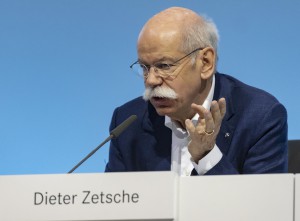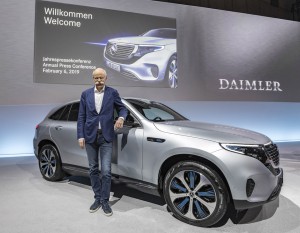
Daimler AG Chairman Dieter Zetsche said the company's earnings performance was unacceptable during earnings meeting recently.
Daimler AG’s income dropped by double digits in the first quarts as sales of Mercedes-Benz vehicles fell in markets around the world, reducing the unit’s earnings before interest and taxes by 37%.
The adverse development at Mercedes-Benz led to a decline of 13% in Daimler AG net income for the quarter as the company’s total revenues remained flat. EBIT was down 15% despite improvements in the earnings of Daimler Financial Services. Daimler Trucks, despite a modest sales increase, saw its earnings decline due to an adverse swing in exchange rates.
Dieter Zetsche, chairman of Daimler’s board of management, said the company had to do better.
“We cannot and will not be satisfied with this – as expected – moderate start to the year,” he said. “We now have to work hard to achieve our targets for 2019. Based on our sales planning and the countermeasures we have already initiated, we are confident that we will achieve those targets.
(Daimler expects acquisition will speed up launch of self-driving trucks. Click Here for the story.)
“In the first few months of this year, we have consistently implemented further elements of our strategy and initiated several important projects: our cooperation at smart with Geely, the development of a joint platform for autonomous driving, and the merger of the mobility services with those of the BMW Group.”
Mercedes-Benz unit sales worldwide dropped 7% to 555,300 vehicles in the first quarter, which. Reasons for the decrease in unit sales include the general market conditions, model changes, constraints on vehicle availability in some international markets as well as intense competition.
Mercedes-Benz revenue fell by 8% to 21.200 billion euros and its earnings before interest and taxes dropped 37%, falling to 1.298 billion euros. At 6.1%, return on sales was below the figure of 9% in the prior-year quarter and barely above that of its non-luxury competitors.
In China, Mercedes-Benz Cars’ largest market, unit sales decreased by 3% to 173,200 units. Sales in the United States fell by 9% to 64,300 units.
(Click Here for more about Penske using Daimler electric trucks for deliveries.)
In Europe, unit sales were down by 4% to 235,300 Mercedes-Benz and smart brand vehicles. Of that total, 78,100 units were sold in the German domestic market, representing a decrease of 1%.
Sales of Mercedes compact cars grew due to the model change initiated in the spring of 2018 with the new A-Class: Sales of the A-Class, B-Class, CLA and CLA Shooting Brake rose by 11% to 108,800 units, setting a record for a first quarter.
At 178,600 units, sales of SUVs were 16% below the level of the prior-year period. Nonetheless, in the first three months of the year, every third Mercedes-Benz automobile sold was an SUV. The G-Class recorded a 53% increase in unit sales in the first quarter, its highest first quarter sales volume.
“We had a comparatively weak start to the year and face numerous challenges along the entire value chain in all our automotive divisions,” said Bodo Uebber, member of the Board of Management of Daimler AG responsible for Finance & Controlling and Daimler Financial Services.
(Daimler spending $500 million on automated truck development. Click Here for the story.)
“This had a negative impact on unit sales and earnings. Above all, high inventories and bottlenecks in the supply chain had a substantial negative impact on the cash flow. Nonetheless, we will continue to invest in our future – sensibly and with a clear focus.”


